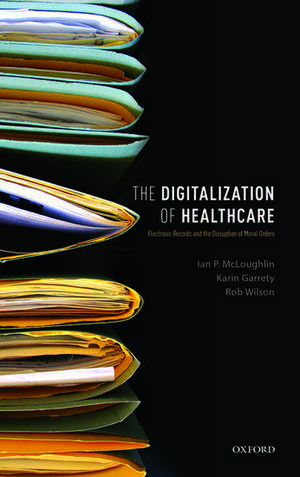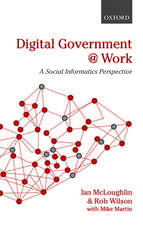The Digitalization of Healthcare: Electronic Records and the Disruption of Moral Orders
Autor Ian P. McLoughlin, Karin Garrety, Rob Wilsonen Limba Engleză Hardback – 2 feb 2017
Preț: 618.78 lei
Preț vechi: 810.01 lei
-24% Nou
Puncte Express: 928
Preț estimativ în valută:
118.40€ • 123.95$ • 97.97£
118.40€ • 123.95$ • 97.97£
Carte tipărită la comandă
Livrare economică 26 martie-01 aprilie
Preluare comenzi: 021 569.72.76
Specificații
ISBN-13: 9780198744139
ISBN-10: 0198744137
Pagini: 212
Dimensiuni: 182 x 241 x 19 mm
Greutate: 0.48 kg
Editura: OUP OXFORD
Colecția OUP Oxford
Locul publicării:Oxford, United Kingdom
ISBN-10: 0198744137
Pagini: 212
Dimensiuni: 182 x 241 x 19 mm
Greutate: 0.48 kg
Editura: OUP OXFORD
Colecția OUP Oxford
Locul publicării:Oxford, United Kingdom
Recenzii
The strength of this book is that it combines the development of theory with the detailed analysis of richly-described case studies. The authors base much of the book around the work of Everett Hughes on moral ordersthat is, in relation to professional practice. The challenges of moral orders in a digitized health service can be understood only on a case by case basis using thick description and narrative analysis. It follows that what the reader will get from this book is an enriched understanding of the complexities of attempting to digitize professional practice.
This book provides a rich set of insights and deep understanding of the complexities faced by those attempting to develop and implement national shared electronic health systems. As someone who has observed such attempts for over 20 years, the sagas recounted are both rich and full, and read to me much like a very familiar 'guide-book to the town of my birth'. The analysis of the progress and fate of the efforts in both Australia and the U.K. offers valuable insights as to what has made progress so difficult and explains why such national projects may not ever fully deliver what is expected, without clarity being developed as to just what the purpose of the project is and what can realistically be achieved.
This important book explores the transition from paper-based to digital health with academic rigor, yet in an easy-to-read style. It describes today's complex and often painful path to computerization, and places the evolution in the broader context of the clinical, ethical, economic, and political forces that are challenging healthcare systems everywhere. Highly recommended!
That the digital revolution disrupts healthcare is not in question. Whether that disruption is always for the good of all is however quite a different question. This book is for those who want to gain insight into this question as it is these questions of moralities and the disruptive effects that they have on local developments and national programmes that is at the heart of this book.
This book provides a rich set of insights and deep understanding of the complexities faced by those attempting to develop and implement national shared electronic health systems. As someone who has observed such attempts for over 20 years, the sagas recounted are both rich and full, and read to me much like a very familiar 'guide-book to the town of my birth'. The analysis of the progress and fate of the efforts in both Australia and the U.K. offers valuable insights as to what has made progress so difficult and explains why such national projects may not ever fully deliver what is expected, without clarity being developed as to just what the purpose of the project is and what can realistically be achieved.
This important book explores the transition from paper-based to digital health with academic rigor, yet in an easy-to-read style. It describes today's complex and often painful path to computerization, and places the evolution in the broader context of the clinical, ethical, economic, and political forces that are challenging healthcare systems everywhere. Highly recommended!
That the digital revolution disrupts healthcare is not in question. Whether that disruption is always for the good of all is however quite a different question. This book is for those who want to gain insight into this question as it is these questions of moralities and the disruptive effects that they have on local developments and national programmes that is at the heart of this book.
Notă biografică
Ian McLoughlin is Professor of Management at Monash University, in Melbourne, Australia. He has conducted research on organizational change and innovation in the UK, Europe and Australasia with a particular focus on the digitalization of public services, including healthcare. He is currently leading a major Australian research project on The Healthcare System of the Future. He also plays a leading role in the Monash-Warwick University Health Care Innovation Alliance established to conduct global research and education in healthcare service redesign and improvement. He has published widely for leading publishers and academic journals. His previous publications include Digital Government at Work: A Social Informatics Perspective, Oxford University Press (2013).Karin Garrety has a PhD in Science and Technology Studies from the University of New South Wales. She has been involved in many research projects investigating technological and cultural change in industry and the healthcare sector. She has published more than twenty peer-reviewed journal articles. Her work appears in Human Relations, Social Studies of Science, Science, Technology and Human Values, Social Science and Medicine, Technology Analysis and Strategic Management, Organization and Social Policy and Society.Rob is a Professor at Newcastle University where he directs the Centre for Knowledge Innovation Technology and Enterprise (KITE). His research interests are in public service innovation and sociotechnical systems: the role that data, information, and information systems play in inter-organizational innovation and relationships. He has over two decades of experience working on and leading public service information system research and development projects. Over the course of his career he has been actively engaged in £4M of research and development projects supported by a range of funding agencies including ESRC, EPSRC, ARC and policy bodies including the NHS and DH.













